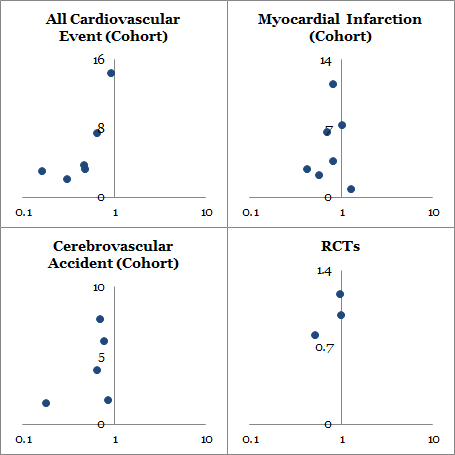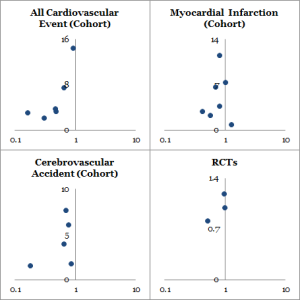Biological agents like anti-TNF α may have benefit not only in reduction of inflammation but also in reduction of cardiovascular event risk on rheumatoid arthritis. This article is systematic review that selects observational cohort studies and randomized controlled trials, the former is statistically significant but the latter is not, respectively. Analysis for publication bias suggested publication bias for all cardiovascular events, so it may be too early to conclude.
Systematic Review and Meta-Analysis: Anti-Tumor Necrosis Factor α Therapy and Cardiovascular Events in Rheumatoid Arthritis
CHERYL BARNABE, BILLIE-JEAN MARTIN, AND WILLIAM A. GHALI
Arthritis Care & Research vol. 63, No. 4, April 2011, pp 522-529
Abstract
Objective
Control of rheumatoid arthritis (RA) may reduce the risk of cardiovascular events. We sought to systematically assess the association between anti–tumor necrosis factor α (anti-TNFα) therapy in RA and cardiovascular event rates.
Methods
Observational cohorts and randomized controlled trials (RCTs) reporting on cardiovascular events (all events, myocardial infarction [MI], congestive heart failure, and cerebrovascular accident [CVA]) in RA patients treated with anti-TNFα therapy compared to traditional disease-modifying antirheumatic drugs were identified from a search of PubMed (1950 to November 2009), EMBase (1980 to November 2009), and conference abstracts. Relative risks (RRs) or hazard ratios and 95% confidence intervals (95% CIs) were extracted. If the incidence was reported, additional data were extracted to calculate an incidence density ratio and its variance.
Results
The systematic review and meta-analysis include 16 and 11 publications, respectively. In cohort studies, anti-TNFα therapy was associated with a reduced risk for all cardiovascular events (pooled adjusted RR 0.46; 95% CI 0.28, 0.77), MI (pooled adjusted RR 0.81; 95% CI 0.68, 0.96), and CVA (pooled adjusted RR 0.69; 95% CI 0.53, 0.89). Meta-analysis of RCTs also produced a point estimate indicating lower risk of cardiovascular events, but this was not statistically significant (pooled RR 0.85; 95% CI 0.28, 2.59).
Conclusion
Anti-TNFα therapy is associated with a reduced risk of all cardiovascular events, MI, and CVA in observational cohorts. There was heterogeneity among cohort studies and possible publication bias. The point estimate of the effect from RCTs is underpowered with wide 95% CIs, and cardiovascular events were secondary outcomes, but RCTs also demonstrated a trend toward decreased risk.


